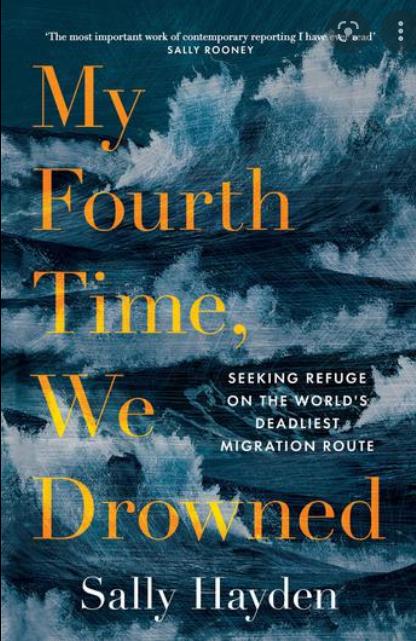Africa-Press – Gambia. Using haunting personal testimonies, Sally Hayden lays bare the 21st century’s biggest human rights scandal in her compelling and emotionally draining book
Sally Hayden had a hard time getting this book about the Mediterranean refugee crisis published. Some literary agents wanted the Irish journalist to write a polemic in favour of open borders; others thought fictionalising her project would make it an easier sell. One warned that because there is no “killer narrative”, it “could never compete with Netflix”.
Thankfully, Hayden stuck to her guns. My Fourth Time, We Drowned may well be a dense, difficult and emotionally draining read, but it is also a hugely important one. Combining vivid reportage, haunting personal testimonies and sober political analysis, this is a superb piece of investigative journalism that lays bare the 21st century’s biggest human rights scandal so far in grimly compelling detail.
Hayden’s assignment began three and a half years ago, when she was a freelance reporter living in London. One Sunday, she received a Facebook message from an unknown source. “Hi sister Sally, we need your help,” it read. “We are under bad condition in Libya prison. If you have time, I will tell you all the story.”
The sender was an Eritrean man who had fled his country’s brutal dictatorship. Like many other persecuted Africans, he tried to reach Europe on a boat but got intercepted by the Libyan coastguard and locked up without charge. Now he was inside a detention centre in Tripoli, using a secret phone shared by hundreds of his fellow detainees.
Hayden responded sympathetically to her new contacts, while making it clear that she could not provide any direct assistance. Social media worked its magic and ever since, her screens have been pinging with horrific first-person accounts from similar institutions. They include stories about rape, slavery, torture and almost every other kind of human cruelty.
Hayden drops snippets from these communications throughout her book, giving it a distinctly eerie feel. “I hope I die soon,” is a typical sentiment. “I’m so scared right now, I can’t sleep… What’s our fault in this life?”
Hayden was not, however, content to be an armchair reporter. The investigation she recounts here involved meeting refugees face-to-face across three continents, attending the trial of people-smugglers in Addis Ababa and travelling on the charity rescue ship Alan Kurdi (named after the three-year-old Syrian boy whose drowned body shocked the world when it was photographed in 2015). “Are you Sally?” a young Libyan man asked her after he was pulled to safety. “I follow you on TwitterFrom this mass of research and experience, Hayden points an accusing finger in several directions. Since 2017, the EU has dodged international law by paying Libya over €100m to intercept refugee boats and make roughly 80,000 sailors disappear from public view. “Coastguard” might sound like a respectable state agency, but in fact it’s a ragbag of ruthless militias with links to human traffickers and slave traders.Hayden is also scathing about the United Nations High Commissioner for Refugees (UNHCR) and other agencies supposed to be providing help on the ground. She documents various examples of waste, inefficiency and corruption, including one scarcely believable incident when asylum seekers were deliberately starved out of a UN centre. As she shows, the UNHCR seems to have been more interested in recruiting celebrity ambassadors such as Angelina Jolie than making sure its handsomely paid staff were actually accomplishing anything useful.
Refugees, Hayden often reminds us, are easy to dehumanise. The former British prime minister David Cameron once referred to “a swarm” heading towards his country, while The Sun printed a column by Katie Hopkins calling them “cockroaches”. Among this book’s many virtues is that it gives migrants back some dignity by allowing them to speak for themselves.
Fatima Ausman Darboe is just one example. She ran away from a despotic regime in the Gambia where elderly villagers are rounded up and forced to drink hallucinogenic drugs as a means of control. There is a gut-wrenching description of how she watched her six-year-old son die from appendicitis over three days in captivity, pleading with the guards as his stomach swelled up.
“Hi. Miss you,” she messaged Hayden after losing her husband as well and returning home. “Things are very bad. No work, no money. I am just managing.”
Even the “lucky ones” who make it to Europe have psychological wounds that may never heal. Hayden talks to them too, including a Somali woman searching for affordable accommodation in Dublin and a Sudanese-Eritrean man in Sweden who notes how well dogs are treated there compared with humans on Europe’s borders.
Inevitably, readers will wonder about the impact of all this on Hayden’s own mental health. She reveals little, apart from admitting some unease over receiving awards for her work and occasional distaste at her colleagues’ behaviour. On one occasion in Calais, she recalls, a British photographer asked her to throw sweets at refugees hiding on train tracks so he could take a better picture.
For her part, Hayden maintains that she is not an activist and has no easy solutions to offer. She wrote her relentlessly earnest and sombre book primarily to shock westerners out of their complacency. In the case of this reviewer, at least, she has fully succeeded.
Non-fiction: My Fourth Time, We Drowned by Sally Hayden
Fourth Estate, 496 pages, hardcover, €18.20; e-book £11.99
For More News And Analysis About Gambia Follow Africa-Press






